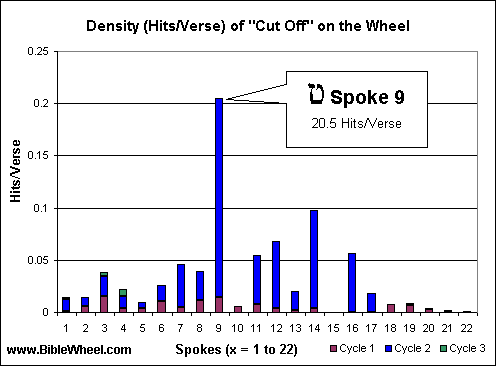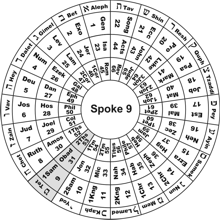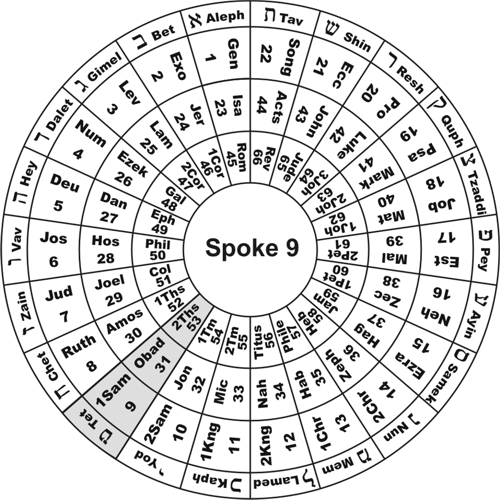How thou art cut off!
4 If thieves came to thee, if robbers by night, (how art thou cut off!)
would they not have stolen till they had enough? if the grapegatherers came to thee, would they
not leave some grapes?
9 And thy mighty men, O Teman, shall be dismayed, to the end that every one of the mount of Esau
may be cut off by slaughter.
10 For thy violence against thy brother Jacob shame shall cover thee, and
thou shalt be cut off for ever.
14 Neither shouldest thou have stood in the crossway, to cut off those of his that did escape;
neither shouldest thou have delivered up those of his that did remain
in the day of distress.
Obadiah 4, 9, 10, 4
These four verses from the little book of Obadiah each contain the phrase "cut off." This means that the
density of this phrase in Obadiah is (4 hits)/(21 verses) = .19 hits/verse. This is far and away the greatest density of this phrase in all the Bible. Here's a
graph of the density distribution on the Wheel:

There are two words translated as "cut off" in Obadiah. The first is the Dalet KeyWord
דמה (damah, S# H1820) - is used once.
It carries the idea of being brought to silence (dumam, S# H1826 - which happens to be
one of the most obviuos adn universal Herbew roots seen throughout the worlds languages, cp. English "dumb.")
The other three occurrences of "cut off" are translated from the fundmantal covenant word
כרת (karat, S# H3772). This word first appears in
Genesis 9:
And I will establish my covenant with you; neither shall all flesh be cut
off any more by the waters of a flood; neither shall there any more be a
flood to destroy the earth.
Genesis 9:11
The debut of karat in the Book of Isaiah is also found in Chapter 9; it is a
very significant coordinated debut that integrates with the
large-scale structure of Scripture and the Hebrew alphabet:
Therefore the LORD will cut off from Israel head and tail,
branch and rush, in one day. The ancient and honourable, he is the head; and the prophet
that teacheth lies, he is the tail.
Isaiah 9:14
The "prophet that teaches lies" integrates with the Ninth Commandment and the great theme of
Spoke 9 (cf. Believing Lies). The reference to the
"head and tail" integrates with Revelation 9 and the shape and meaning of Tet as serpent.
Karat is the "covenant word" - when God says He will "make" a covenant, the literal Hebrew is to "cut" a
covenant, as seen here in Deuteronomy 9:9 when Moses recounts the reception of God's Covenant:
When I was gone up into the mount to receive the tables of stone, even the tables of the
covenant which the LORD made [karat] with you, then I abode in the mount forty days and forty nights,
I neither did eat bread nor drink water:
Deuteronomy 9:9
The great manifestation of this theme and the relation between the God's Covenant and the idea of Cutting
is found in Daniel 9:
Know therefore and understand, that from the going forth of the commandment
to restore and to build Jerusalem unto the Messiah the Prince shall be seven
weeks, and threescore and two weeks: the street shall be built again, and the wall, even in troublous times.
And after threescore and two weeks shall Messiah be cut off, but not
for himself: and the people of the prince that shall come shall destroy the city and
the sanctuary; and the end thereof shall be with a flood, and unto the end of the
war desolations are determined.
Daniel 9:26
The cutting off of the Messiah is how God established His Covenant of Peace.
We have the identities:
| Covenant of Peace

B'rit Shalom |
|
= 988 = |
| Messiah shall be cut off

Yikrat Meshiah |
|
This is discussed in detail in the Spoke 4 article A Covenant of Peace.
| 


